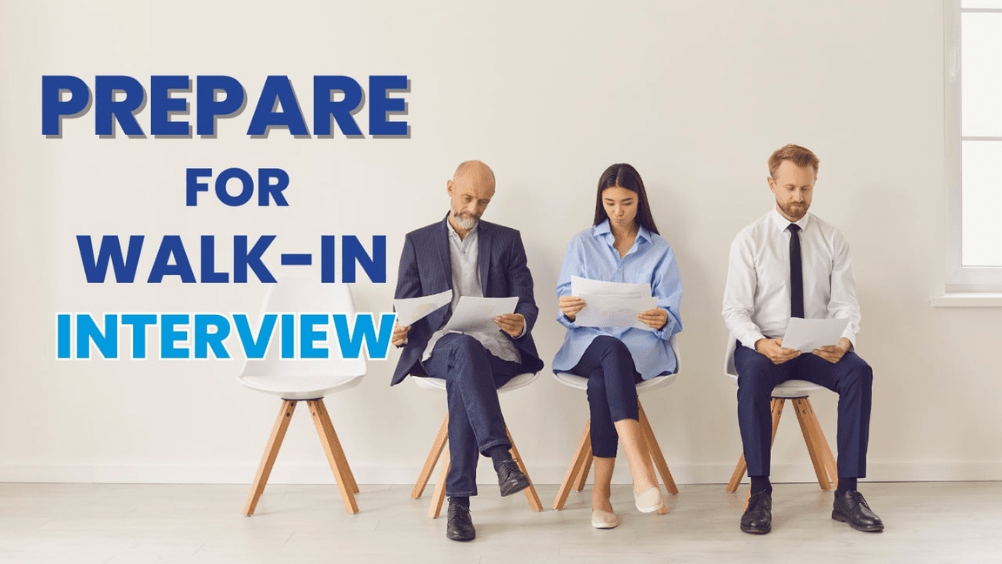



Walk-in interviews can be a whirlwind of excitement and nerves. You've got one shot to make a great impression without the luxury of a scheduled appointment. But don't worry! With the right preparation, you can walk into any interview with confidence.
Here's how you can master the art of the walk-in interview and potentially walk out with a job offer.
Before the day of the interview arrives make sure you thoroughly research the company and note down some pointers which can add more value to it and help the company perform better. his isn’t just to impress your interviewers—it’s to ensure the company aligns with your career aspirations. Understanding the company's core can significantly tailor your answers and show that you Find a job and the right one.
Prepare for the common interview questions that HR often asks. In a walk-in interview, time is of the essence. Craft a concise and compelling pitch that encapsulates who you are, what you've done, and what you can bring. This elevator pitch is your moment to shine, so refine it until it feels natural and convincing. Lastly, you should prepare your documents such as - resumes, cover letter, and list of references (if any).
Here’s a comprehensive guide packed with practical tips to crack your next walk-in interview-
From the moment you step into the room, you are being assessed. Dressing appropriately cannot be overstressed; choose professional attire that suits the industry you're applying to. Make sure you’re groomed and carry a neat portfolio with extra copies of your resume, a list of references, and any other relevant documents. Remember, punctuality is key in demonstrating your respect for the interviewers’ time — aim to arrive at least 15 minutes early.
Engagement starts with the introduction. Make eye contact, offer a firm handshake, and greet each interviewer personally if you're facing a panel. These gestures might seem small but go a long way in setting a positive tone.
When discussing your background, don’t just recite your resume. Instead, share anecdotes about your family, hobbies, and interests that align with the job role, treating the common prompt “Tell me something about yourself” as an opportunity to showcase your personality and professionalism.
Think of the interview as a conversation and not as an interrogation. This change of perspective will help you feel less pressured and more at ease. You must know every detail of your resume well, as you may need to discuss parts of it. If you're asked about a gap in your employment or a particular experience, don’t evade the question. Instead, answer confidently and steer the conversation to how that experience prepared you for the job in question.
It’s okay not to know every answer. If you’re unsure about a question, it's better to be honest rather than guessing. Express your willingness to learn or find out more rather than leave the question hanging. For the inevitable “Why this company?” question, express genuine reasons like the company’s reputation, the potential for personal growth, or alignment with your career goals. Avoid overly scripted answers; sincerity is more relatable and appreciated.
Towards the end of the interview, you will often be asked if you have any questions. Use this opportunity to find out more about the job and the company. Ask about the challenges you might face, the dynamics in the team, or the company’s plans for the future. This shows your interest in the position and your proactive attitude.
As the interview wraps up, remember that the closure is as critical as the introduction. A warm smile and a firm handshake can leave a lasting impression. Politely thank each interviewer by name, acknowledging their time and consideration. This polite acknowledgment demonstrates professionalism and leaves the door open for future interactions.
Finally, it’s important to keep the interview in perspective. Do not overstress its importance to the point where it cripples your performance. Treat it as a significant step, but remember, it is not the sole determinant of your career. This mindset will help reduce anxiety and position you to perform at your best.
A walk-in interview doesn’t have to be a daunting experience. With the right preparation, a positive attitude, and a good understanding of the dynamics of interpersonal communication, you can excel. Remember to leverage your strengths, remain authentic, and engage actively with your interviewers. Make sure you are not late for the interview rather it’ll be great if you can reach before 15 mins. By following these tips to crack a walk-in interview, you’re not just preparing to succeed; you’re setting the stage for an impactful career journey.